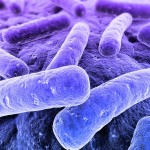
As bacteraemia occurs during toothbrushing (Dental Elf 5th Oct 2011) it is to be anticipated during more invasive activities such as flossing, scaling (Dental Elf 9th Jan 2013) and dental extractions. The main aim of this study was to directly compare and determine the effect of a pre- procedure rinse of 0.12% chlorhexidine on the incidence and magnitude of bacteraemia compared to the 2g amoxicillin during third molar extractions.
Patients requiring third molar extraction under conscious sedation were randomised to one of three groups: a control/placebo group (PLAC) receiving a placebo rinse and a placebo capsule; a rinse group (CHX) receiving a 0.12% chlorhexidine rinse and a placebo capsule; or an antibiotic group (AMOX) receiving 2 g amoxicillin capsule and a placebo rinse. Blood samples were taken at four time points during the procedure and processed on an on-site laboratory. Bacteraemia was defined as at least one positive culture of the four BDs per subject and reported as a percentage.
- 30 patients completed the study, 10 per group.
- There was no statistically significant difference in the incidence and magnitude of bacteraemia between the three groups.
- There was a 50% incidence of bacteraemia in the (PLAC); 60% in the CHX group and 40% in the AMOX group.
The authors concluded
The results of this novel study may reasonably conclude an oral rinse or systemic antibiotic antimicrobial intervention does not statistically reduce the incidence and magnitude of bacteraemia compared to no antimicrobial intervention.
Comment
This is an interesting if small study, probably underpowered, that showed no statistical difference between the two group. The authors note that ,
‘routine use of antibiotic prophylaxis for dental treatment procedures is not without negative consequences with respect to antibiotic resistance, anaphylactic allergic responses, and cost-effectiveness.’
While the authors discuss concerns related to infective endocarditis one of the commonest problems following third molar extraction is dry socket. A recent Cochrane review by Lodi et al found that in health patients, There is evidence that prophylactic antibiotics reduce the risk of infection, dry socket and pain following third molar extraction and result in an increase in mild and transient adverse effects. Their data indicated that,
To prevent 1 infection between 10 and 17 people will require antibiotics, and to prevent a case of dry socket between 24 and 250 people would need to receive antibiotics. They consider that this benefit is not big enough to recommend routine use, because 21 of those prescribed antibiotics would have mild adverse effects and there is also the potential of contributing to the development of bacterial resistance.
Links
Duvall NB, Fisher TD, Hensley D, Hancock RH, Vandewalle KS. The comparative efficacy of 0.12% chlorhexidine and amoxicillin to reduce the incidence and magnitude of bacteraemia during third molar extractions: a prospective, blind, randomized clinical trial. Oral Surg Oral Med Oral Pathol Oral Radiol. 2013 Feb 27. doi:pii: S2212-4403(12)01759-2. 10.1016/j.oooo.2012.11.019. [Epub ahead of print] PubMed PMID: 23453612.
Dental Elf 5th Oct 2011 – Bacteraemia due to everyday oral activities
Dental Elf 9th Jan 2013 – Flossing, scaling and bugs in the blood
Lodi G, Figini L, Sardella A, Carrassi A, Del Fabbro M, Furness S. Antibiotics to prevent complications following tooth extractions. Cochrane Database of Systematic Reviews 2012, Issue 11. Art. No.: CD003811. DOI:10.1002/14651858.CD003811.pub2.
